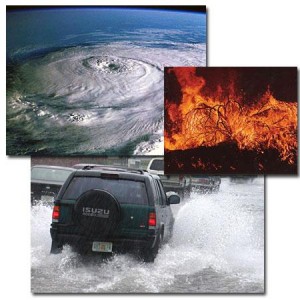♫ Without a warning, you’re outta control.
The ground shakes and the oceans roll-
This is the big one, there’s no way to run…♫
Lyrics and music by: Gerry House, Devon O’Day, recorded by George Strait.
This is a wonderful guest post from Robert Denney. While the east coast was being hammered by Sandy, the west coast was experiencing earthquakes (fortunately the impact was minor and there were no tsunamis). In either case, these events only brought to the forefront the need for a disaster plan in each law office. Here is Bob’s advice in this regard:
In addition to wreaking havoc and even tragedy in the lives of millions of people and disrupting the operations of countless law firms and businesses, Hurricane Sandy also confirmed the need for firms and businesses to have emergency or disaster plans. Unfortunately some did not and others, including even the New York Stock Exchange, learned their plans were inadequate.
There are two types of disasters that require emergency planning:
- impending disasters such as a major storm or flood which can usually be predicted and prepared for
- other disasters such as fires and explosions which occur without warning.
Regardless of the type of disaster, pre-planning is essential because, in the midst of an emergency,confusion, lack of time and heightened emotions can cause additional losses. There are two phases of an emergency plan:
- The first is Emergency Response which addresses the safety of a firm’s most valuable assets – its employees, property and facilities.
- The second is Business Continuity which addresses the essential operations – including people, equipment, systems, data and technology – so the firm can continue to function and clients’ matters and cases can be handled with little or no interruption, whether at its offices or off-site.
In each phase of the plan there are many steps and initiatives that must be considered. We will mention only three of them:
- Safeguard important documents. Electronic storage or back-up should actually be part of the firm’s daily operations.
- Communicate to personnel. There should be a separate emergency hotline for the firm to advise all personnel – lawyers and staff – of the status of the situation.
- Communicate to clients. As soon as possible advise clients on the status of the firm’s operations and how their matters will be handled during the emergency.
Note: If your firm does not have an emergency plan, the local bar association or local chapter of the Association of Legal Administrators (ALA) can be a resource. [Editors note: In British Columbia it is the British Columbia Legal Management Association.]
Thanks Bob for yet another great post on how to survive the [next] big one!
Robert Denney Associates Inc. provides strategic management and marketing counsel to law firms, companies and non-profit organizations throughout the United States. Previous Communiques as well as information about our services may be viewed on our web site.
P.O. Box 551, Wayne, PA 19087-0551 • 610-644-7020 • fax: 610-296-8726
email: bob@robertdenney.com • web site: www.robertdenney.com



















